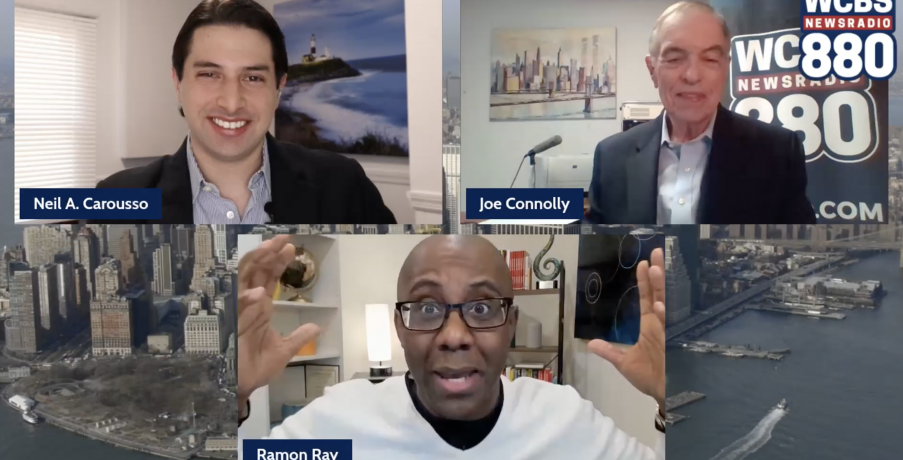
Neil A. Carousso produces NewsNation original “Kurt’s Country” – a celebration of country music and a slice of Americana with host Kurt Bardella.
The Latest

Elevate Your Business Event: Media & Strategy Mastery

Mastering Media Strategies: Insights from Industry Veterans

The Multi-Tiered Approach to Gaining Exposure and Credibility. Become a Repeat Source for the Media

Husband Sent Flirty Texts before Mica Miller’s Death, Waitress Says

Kristi Noem on Retraction: Kim Jong Un ‘Should Not be in the Book’

Kevin O’Leary: AI bossware can ID protesters and bar them from jobs

Neil A. Carousso Joins Growing NewsNation Network

Neil A. Carousso Departing WCBS 880

Art Business Founded by Former Foster Child Speaks to the Human Experience

1010 WINS Small Business $10K Challenge: Small Business Owners Make their Pitch for $10,000
-
Taking the Leap: Growing and Scaling a Business Amid Great Resignation
Posted by: Neil A. CaroussoPost Views: 671By Joe Connolly and Neil A. Carousso
NEW YORK (WCBS 880) — Many people who started businesses while working from home are quitting their jobs to run their companies full-time.
“I love the independence of entrepreneurship,” said Ramon Ray, founder of Smart Hustle Media, on the WCBS Small Business Spotlight, sponsored by Dime Community Bank.
Ray has made a career out of his passion for small businesses, advocating for digital growth tools and community support. During the COVID-19 pandemic, the serial entrepreneur saw so-called “solo-preneurship” booming and wrote an e-book guide “Grow Your Solo” in which Ray outlines steps to start and grow a sole-proprietorship.
“You can scale the business to the size that you want and be happy with that and live the life you want,” he told WCBS 880.
A record 5.4 million Americans submitted new business applications in 2021, a number that has accelerated since July 2020 as economists and employers became aware of the great resignation phenomenon.
One of the greatest challenges new business owners face is pricing their products and services.
“Let’s say in the Northeast, right – us people – you want to pay yourself $150 (thousand), $200 (thousand), whatever it is,” Ray said. “Now, maybe triple that.”
The small business expert noted owners have to pay employees and contractors, overhead costs, operating expenses, other unforeseen costs, plus taxes. That’s a big adjustment for entrepreneurs who have left high-paying salaried jobs.
Ray started Smart Hustle while working at the United Nations. He told Joe Connolly and Neil A. Carousso that he was fired about seven years ago with one client on his roster.
“I had a $40,000 client. That’s all I had, Joe, but it was able to give me enough cushion and a starting point, a runway, to begin my full-time business,” said Ray.
He accepted monthly payments from the client to stay afloat and support his family while selling his services to more clients.
He suggests owners secure a few good clients, first, before taking the leap. At the same time, he believes entrepreneurs who are confident in their business will succeed if they are passionate and motivated.
As a small business owner himself, Ray consults with large national and international firms as clients and is the entrepreneur-in-residence at NetSuite, Inc., a leading cloud computing software company.
“If you’re trying to bid or sell for a larger project, don’t try to pretend and say, ‘We, we, we. We have 100 people back there,’ when you don’t. They’ll smell through that, so you can’t sell on that,” he explained, adding, “But, you can sell them on the passion and commitment and your, hopefully, past success and talk about, ‘We’re small, but we’re nimble. Maybe we can be more price competitive. We have an amazing team that will serve your needs and we will be your only focus.'”
Ray also advises to sell services directly to an executive within a company because that person can be a key endorsement and referral to other departments within the firm.
See more advice and inspiration for starting, growing and scaling a business on the WCBS Small Business Spotlight video above.
-
Midtown Music Store Attracts Global Audience with Digital Marketing Strategy
Posted by: Neil A. CaroussoPost Views: 600By Joe Connolly and Neil A. Carousso
NEW YORK (WCBS 880) — It’s all about that brass.
J. Landress Brass, a niche musical instrument store on W. 32nd Street in Midtown Manhattan, now has customers all around the world.
“We have instruments that people are sending us to restore from California, from Iowa, from Indiana, all over the United States,” said owner Josh Landress. “Just this week, we’ve shipped out instruments to Germany, to France, to Korea, and that’s all generated through our online presence.”
On the WCBS Small Business Spotlight, sponsored by Dime Community Bank, Landress told Joe Connolly and Neil A. Carousso that he focused on growing the company’s Facebook and Instagram accounts during the COVID-19 shutdown in March 2020. They posted videos showing their craftsmanship repairing brass instrument valves and fixing dents as well as showcasing individual performances.
“People have discovered our abilities outside of us helping New York and they really are coming to us for our skills – as far as our craft – and for our products that we’re selling, we’re having a very curated high-end business of retail,” he said.
Landress told WCBS 880 the company’s revenue increased 60 percent since making digital sales and marketing a focul point.
“For many years, my business was kind of derived with local New York business kind of supporting the New York community,” he explained. “I really had to find a new direction for my business in order to keep my employees employed and the doors open and with that was really generating more online traffic so the use with Instagram and Facebook.”
While J. Landress Brass expanded globally, its hometown customers in New York demonstrated why they are the heart and soul of the business.
Several customers created a montage video while the store was shuttered, performing Gloria Gaynor’s “I Will Survive” on their instruments at home. When J. Landress Brass reopened, they were greeted with scores of new customers.
“We were still doing what we do once we reopened after being closed for 115 days and people in the community came here just to say hello, and be around instruments, and see other people just to feel normal again,” said Landress. “It was really an honor to be a part of that.”
See this heartwarming story of how the local music community rallied around J. Landress Brass and how the company has amassed a global audience on the WCBS Small Business Spotlight video above.
-
How ‘SNL’ and Late Night Talk Shows Saved the Transportation Industry
Posted by: Neil A. CaroussoPost Views: 746By Joe Connolly and Neil A. Carousso
NEW YORK (WCBS 880) — One key linchpin is responsible for revving New York City’s economy, according to an influential transportation industry leader.
“I got to give a heads up to Lorne Michaels,” said Jeff Rose, founder and president of Attitude New York on the WCBS Small Business Spotlight, sponsored by Dime Community Bank.
Michaels is the creator and Emmy award-winning executive producer of NBC’s “Saturday Night Live.” He also manages “The Tonight Show” and has an illustrious career producing NBC’s primetime television sitcoms and dramas, late night talk shows and films.
“We do quite a bit of work for the late night talk shows,” said Rose.
Attitude New York relies on the hospitality industry, chauffeuring A-listers to press events and dinners at restaurants across the city. Car and limousine services took a huge hit when the pandemic shut down Broadway and New York’s hospitality and entertainment sector.
“All those shows getting back on the air were huge, not just for the work that they did, but because then, now that they’re broadcasting live, it forces people who have projects to promote to come to the studio, and while they’re in New York, they do other things,” he explained. “Entertainment is something that has a huge multiplier effect on the transportation industry in New York, so props to all those people who got entertainment back on the air and helped revive the city’s economy.”
Rose told Joe Connolly and Neil A. Carousso that his business was down 98 percent at the height of the COVID-19 pandemic, but since last September, Attitude has roared back; although, it faces drastically different travel habits.
“Some of the not so strong operators are going to be out of it, but as I said, I think more capacity was lost than demand and when that demand comes back, I think it’s going to be a very healthy situation as folks are much more interested in having a cleaner cars, more reliable,” he said.
Attitude New York added long-distance trips to meet shifting demand away from airline travel and ride-sharing apps in which some people are apprehensive over the volume of passengers in a still raging pandemic.
“We got lots of calls from studios who were shooting movies up there to drive actors up to Montreal in Canada. We even had one case where we drove all the way from New York up to Plattsburgh, somebody flew in on a jet, and then, we just drove them across the border,” said Rose, adding, “We had a secret weapon and that we had a chauffeur with dual citizenship. He held a Canadian passport. So we kind of became the go to operator for all these companies that had to get actors up to Montreal and Toronto to get to film sets.”
Rose also serves as president of the Limo Association of New York and sits on the board of the National Limousine Association. His father imparted on him the value of philanthropy and explained to Connolly and Carousso his philosophy of giving back during tough times.
“Driving is the number one job in the country, not necessarily limousines or car service(s), but if you include truck drivers deliveries, FedEx, so on and so forth,” he said. “This is a job that doesn’t require a high school diploma, doesn’t require a college degree, English can be your second language. This is an important industry for moving people around and for the jobs that it creates.”
He welcomes people into his growing industry with open arms.
“That’s one of the things I do to give back,” Rose said.
New people entering the vast transportation industry will face several bumps in the road, including an unprecedented and fast change of travel habits and the move to electric vehicles.
Rose said on the Small Business Spotlight that executives at General Motors, Ford and Lincoln have told him there is not enough infrastructure, yet, to support a 50 percent national adoption this decade as the Biden Administration has proposed.
“They’ve said it’s going to be a big problem in the Northeast. Electric cars are going to come on much more quickly in the South and much more slowly in the Northeast, and I asked about it. I said, ‘Is that about climate?’ They said no, it’s about in congested cities, they don’t have places to put charging stations. So, even if you had the charging stations, you don’t have the power generation nor the transmission infrastructure ready to support a significant number of vehicles going electric,” he explained.
See more on the future of New York’s inter-connected transportation industry on the Small Business Spotlight video above.
-
Small Business Spotlight: Biggest Financial Pitfalls to Avoid in 2022
Posted by: Neil A. CaroussoPost Views: 734By Joe Connolly and Neil A. Carousso
NEW YORK (WCBS 880) — Mistakes can be costly, especially during such an uncertain time.
On the WCBS Small Business Spotlight, sponsored by Dime Community Bank, Joe Connolly and Neil A. Carousso talked to Jean Chatzky, an award-winning financial journalist and CEO of HerMoney Media, Inc., who shared some of the most common mistakes business owners make and new businesspeople should avoid.
1. Not Enough Working Capital
Chatzky says a common mistake new business owners make is failing to plan for how much capital they need beyond getting started.
“Particularly right now with so many people joining the great resignation, leaving their workplaces, we’ve seen a lot of people, particularly women, launch businesses, hang out a shingle, take their skills, and try to turn it into a revenue stream for themselves,” she said, continuing, “If you could do it with a client or two under your belt, that’s fantastic, but you need to also understand what it’s going to cost you not just to get going but to keep going as you gain some ground.”
Chatzky advises business owners to plan for enough working capital to see some success. She also tells budding entrepreneurs to pay close attention to what people tell them that they are good at and pursue an area where they can charge for their skills.
The so-called “great resignation,” she alluded to, is putting pressure on the most hard-hit industries struggling to recover from the pandemic. A record 4.5 million Americans quit their jobs in November, according to the U.S. Bureau of Labor Statistics. Workers in the hospitality industry were most likely to leave for higher paying jobs.
Chatzky said preventing costly turnover comes down to managing relationships.
“If you’ve got people on your team that you want to help grow, that you want to encourage to grow, you need to know what they want, right? If you’re not asking them what they want, then they’re going to look for what they want elsewhere,” she said.
2. Operating Too Big
“You got to be scrappy, especially when you’re bootstrapping,” said Chatzky.
The financial expert recalled an instance early on at HerMoney Media, which Chatzy co-founded in 2018, when a client left a big investment bank to start his own company.
“He wanted to do some focus grouping,” she said. “His idea was, ‘Well, you hire a focus group company.’ And, my idea, was, ‘No, you send out some feelers through your social channels and your newsletter and you ask people to show up for a Zoom call that costs you nothing.'”
The small business mindset will help owners and managers serve their customers and turn profits while operating lean.
3. Underestimating the Hiring Process
Chatzky explained on the Small Business Spotlight that business owners often underestimate the importance and difficulty of hiring.
“Realize what you can’t do. Realize what you’re not good at. And, as you start to bring in other people to support you whether they’re employees or contractors or freelancers, look for people who do those things better than you do. Don’t be threatened by the fact that they have skills that you don’t,” she said.
She told Connolly and Carousso that she hires people in their 20s for their social media skills. The HerMoney Media CEO recommends contracting out to potential employees for a period before putting them on payroll to see if they are a good fit for their company.
Despite all the challenges businesses face with the ongoing COVID threat, Chatzky believes business owners are more optimistic than most people.
“I think business owners have an inherent sense that this is going to work, that I can do this,” she said, adding, “They’re more confident in their own abilities. That can be good and that can be bad, right? If you’re overly confident, you can lead yourself astray, but I do think they’re different in that way. Some business owners just don’t want to work for anybody else. I think there’s definitely a breed like that; I think it’s a growing breed.”
She told WCBS 880 she sees her customers and her employees as her bosses. It helps keep her grounded and her firm growing.
Chatzky co-hosts a new national radio show with journalist Soledad O’Brien called “Everyday Wealth,” presented by Edelman Financial Engines.
“The listeners are anybody who is looking to make more of their money,” said Chatzky.
Everyday Wealth airs Sundays at 11 AM on WCBS Newsradio 880.
Watch Joe Connolly and Neil A. Carousso’s full conversation with Jean Chatzky on the Small Business Spotlight video above.
-
NYC Comes to Grips with New Normal, Changes Ahead for COVID-Battered Economy
Posted by: Neil A. CaroussoPost Views: 839By Joe Connolly and Neil A. Carousso
NEW YORK (WCBS 880) — The changes brought on by COVID-19 are being cemented this year.
As cases and hospitalizations continue to soar amid a new wave fueled by the highly contagious Omicron variant, companies have been forced to nix plans to bring remote workers back to the office. The longer people work from home – some for nearly two years – the more difficult it will be to get them back into the workplace, said Kathryn S. Wylde, president and chief executive officer of the Partnership for New York City.
“It’s a big setback in the sense of the psychology more than the economy,” she said. “As long as people are functioning remotely and buying their stuff on the Internet rather than patronizing our local stores, we’re going to see a slowdown in the recovery of our brick-and-mortar economy.”
On the WCBS Small Business Spotlight, sponsored by Dime Community Bank, Wylde told Joe Connolly and Neil A. Carousso that employers are facing the reality that remote work is here to stay.
“Our survey says 80 percent of companies are looking at what’s called a hybrid work schedule where people will at least work two or three days in the office, the other days at home, and that’s going to be the new normal post-pandemic,” the business leader said.
She told WCBS 880 many younger people prefer working remotely, but they’re missing out on mentorship. Partnership for New York City members JP Morgan Chase & Co, Citigroup and Goldman Sachs have all continuously delayed their return to the office despite their leaders being staunch proponents of in-person work.
“We’ve had a Manhattan-centric economy for a very long time, at least since the 1970s,” said Wylde, noting a seismic shift in the local economy because of the pandemic.
As the head of the city’s foremost business group, Wylde has had numerous conversations with Mayor Eric Adams since being elected. Their professional relationship goes back years since Adams served in the NYPD, and later, Brooklyn Borough President. She told Connolly and Carousso the Adams Administration is considering new ways of spurring growth in neighborhoods outside Manhattan where people have been working from home.
“So, I think your point that we’re going to see business interests and real estate interests across the five boroughs actually benefit over the long-term of the de-concentration of economic activity across the city is very appropriate,” said Wylde.
The Partnership for New York City reports about 19 percent of Manhattan office towers are vacant. Wylde believes many of the old buildings will be torn down and replaced by residential apartments.
“There are a number of old buildings (in Midtown East) that don’t lend itself to residential conversation or any other conversation that will probably come down as you’re seeing happen with the RXR (Realty) project where they’ve taken down the Grand Hyatt and they’re going to rebuild a whole new setting that includes all these mixed-use and entertainment to retail as well as office structures,” she said, adding, “That’s going to be the plan of the future.”
New York City’s unemployment rate of 9 percent is more than double the national average of 4.2 percent. New York has added back a little more than half the jobs it lost in the pandemic, according to the U.S.
Bureau of Labor Statistics.“We still have 360,000 people who have lost their jobs during the COVID and may not be qualified – probably most are not qualified – for the available job openings,” said Wylde.
She told Connolly and Carousso that Mayor Adams has been all ears on solutions.
“Closing that skills gap is another priority he has, and rather than telling us how he’s going to do it, he’s asking us how we can do it together with employers, with entrepreneurs, how we can do this together.”
Wylde said on the Small Business Spotlight the mayor wants to start internships for high school students and improve job training for college students to get them jobs in their hometown.
The business group is also working with the city to connect small businesses with big corporations as clients.
“Individual businesses have their own set of procurement with small and minority-owned businesses, but often, if they’ve got somebody good, they don’t want to share them or that small business may not have access to the support and the financing they need to grow and serve more customers,” explained Wylde.
She is hopeful Mayor Adams and Gov. Kathy Hochul will see the value in unlocking city and state resources to help small businesses meet the demands of big companies as vendors.
“We have to organize it and create a system,” she said of the vetting process.
See more on the reshaping of New York City’s economy on the Small Business Spotlight video above.











